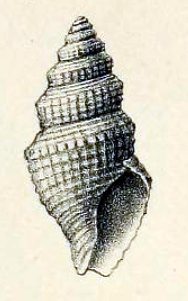Biology:Taranidaphne nereidum
| Taranidaphne nereidum | |
|---|---|

| |
| Original image of a shell of Taranidaphne nereidum | |
| Scientific classification | |
| Domain: | Eukaryota |
| Kingdom: | Animalia |
| Phylum: | Mollusca |
| Class: | Gastropoda |
| Subclass: | Caenogastropoda |
| Order: | Neogastropoda |
| Superfamily: | Conoidea |
| Family: | Raphitomidae |
| Genus: | Taranidaphne |
| Species: | T. nereidum
|
| Binomial name | |
| Taranidaphne nereidum (Melvill & Standen, 1903)
| |
| Synonyms[1] | |
|
Daphnella (Pleurotomella) nereidum Melvill & Standen, 1903 | |
Taranidaphne nereidum is a species of sea snail, a marine gastropod mollusk in the family Raphitomidae.[1]
Description
The length of the shell attains 7 mm, its diameter 3 mm.
(Original description in Latin) The delicate ovate-cylindrical shell is semi-transparent and has a milky white color. It contains 8-9 whorls of which 2⅓ or 3 whorls in the protoconch. These are pale reddish and rather thinly decussate. The subsequent whorls are angular in the middle part. The suture is slightly impressed. The ribs and the transverse lirae are crystalline. The body whorl is angular above the middle part and with ribs often vanishing on its backside. The aperture is narrow and ovate with a white interior. The outer lip is thin. The siphonal canal is short and slightly recurved.[2]
Distribution
This marine species occurs in the Gulf of Oman
References
- ↑ 1.0 1.1 Taranidaphne nereidum (Melvill & Standen, 1903). Retrieved through: World Register of Marine Species on 5 April 2010.
- ↑ Melvill J.C. & Standen R. (1903). Descriptions of sixty-eight new Gastropoda from the Persian Gulf, Gulf of Oman, and North Arabian Sea, dredged by the Indo-European Telegraph Service, 1901–1903. Annals and Magazine of Natural History. ser. 7, 12: 289-324
External links
- Tucker, J.K. (2004). "Catalog of recent and fossil turrids (Mollusca: Gastropoda)" (PDF). Zootaxa 682: 1–1295. http://www.mapress.com/zootaxa/2004f/z00682f.pdf.
Wikidata ☰ Q3714852 entry
 |

